
An analysis on the impact of stroke severity in patients receiving the HeartWare HVAD system (Medtronic) as destination therapy shows that targeted blood pressure management helped reduce serious strokes. The HVAD system is a left ventricular assist device (LVAD) that is designed to increase the amount of blood that circulates through the body in patients with advanced heart failure.
According to a press release, the retrospective analysis used data from both the ENDURANCE and ENDURANCE Supplemental randomised trials. In the latter trial, patients received optimal blood pressure management. Presented at the 2019 International Society for Heart and Lung Transplantation (ISHLT) Scientific Sessions, the researchers found that:
- Freedom from disabling stroke at two years was 91% in the HVAD cohort.
- Survival was significantly higher for HVAD patients who experienced a non-disabling
- stroke compared to patients who had a disabling stroke (76% vs. 29%; p<0.0001; one-year post-stroke event).
- For patients receiving the control device, survival was also greater in patients with
- non-disabling compared to disabling strokes (71% vs. 17%; p<0.0001).
- In patients who experienced a stroke of any severity, those receiving the HVAD
- pump tended to have a lower stroke-related mortality rate than patients receiving
- the control device (17% vs. 27%; p=NS).
- The current analysis demonstrated a 23% reduction in total strokes, a 36% reduction in disabling strokes, and a 39% reduction in stroke-related mortality in patients in the ENDURANCE Supplemental HVAD arm compared to those in the original ENDURANCE trial HVAD arm.
In the ENDURANCE Supplemental Trial, a total of 465 patients were randomised in a two-to-one ratio to receive the HVAD system or a control device, i.e., an alternative LVAD approved by the FDA for destination therapy. A prespecified blood pressure management strategy was applied to patients in the HVAD arm, in an effort to reduce the stroke rate seen in earlier trials.
Jeffrey Teuteberg, section chief of Heart Failure, Cardiac Transplantation, and Mechanical Circulatory Support, and associate professor of medicine at Stanford University (Stanford, USA), comments: “This analysis shows that stroke severity is an important determinant of outcomes, and the use of the HVAD system with a guidelines-based blood pressure management strategy can, in addition to reducing overall stroke rates, reduce the occurrence of disabling stroke and improve survival in patients who experience strokes. We also found that patients with a stroke in the HVAD cohort had better survival than those who received the control device. These results reinforce the importance of blood pressure management with the HVAD for end-stage heart failure patients.”
To further confirm the safety and effectiveness of the HVAD system in “real-world” clinical practice, Medtronic has initiated two studies: The Destination Therapy post-approval study (DT PAS) and the Apogee Study, which will look at how to improve patient outcomes through best practices in blood pressure management, anticoagulation/antiplatelet therapy, and implant procedure.
The DT PAS is a prospective, observational study of 300 newly implanted destination therapy patients at approximately 50 US sites, which will follow patients up to five years. The primary objective is long-term, complication-free survival over two years. Apogee is a prospective, observational, multisite study involving DT PAS patients who consent to an additional heart failure management protocol and data collection for one year. The primary objective is to understand how blood pressure management, anticoagulation/antiplatelet therapy and implant procedures affect the 12-month rate of overall major adverse events, including infection, bleeding, device malfunction, stroke or death.
The studies are led by co-principal investigators Nader Moazami (Heart Transplantation and Mechanical Circulatory Support, NYU Langone, New York, USA) and Jennifer Cowger (Mechanical Circulatory Support Program at Henry Ford Health System, Detroit, USA).











